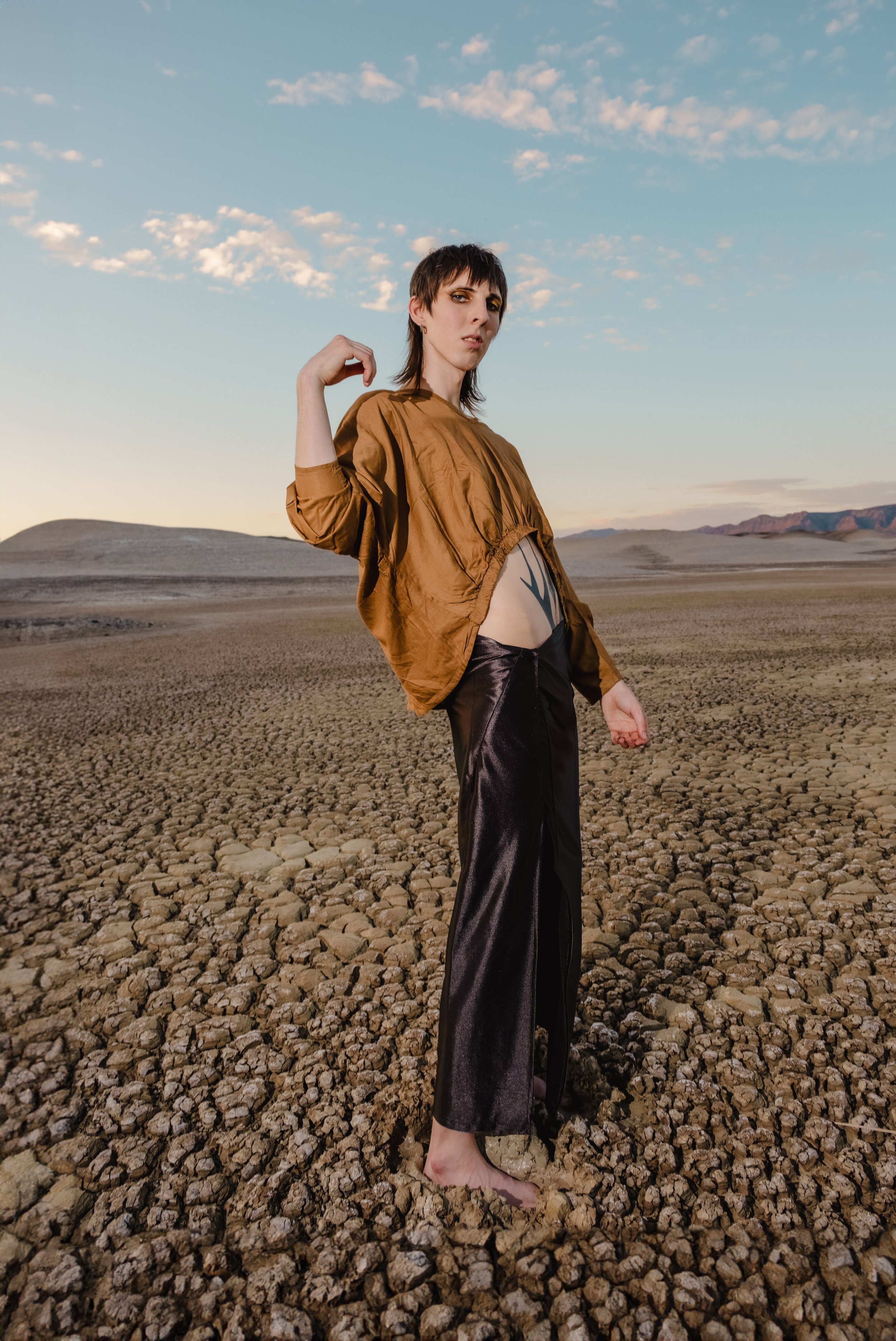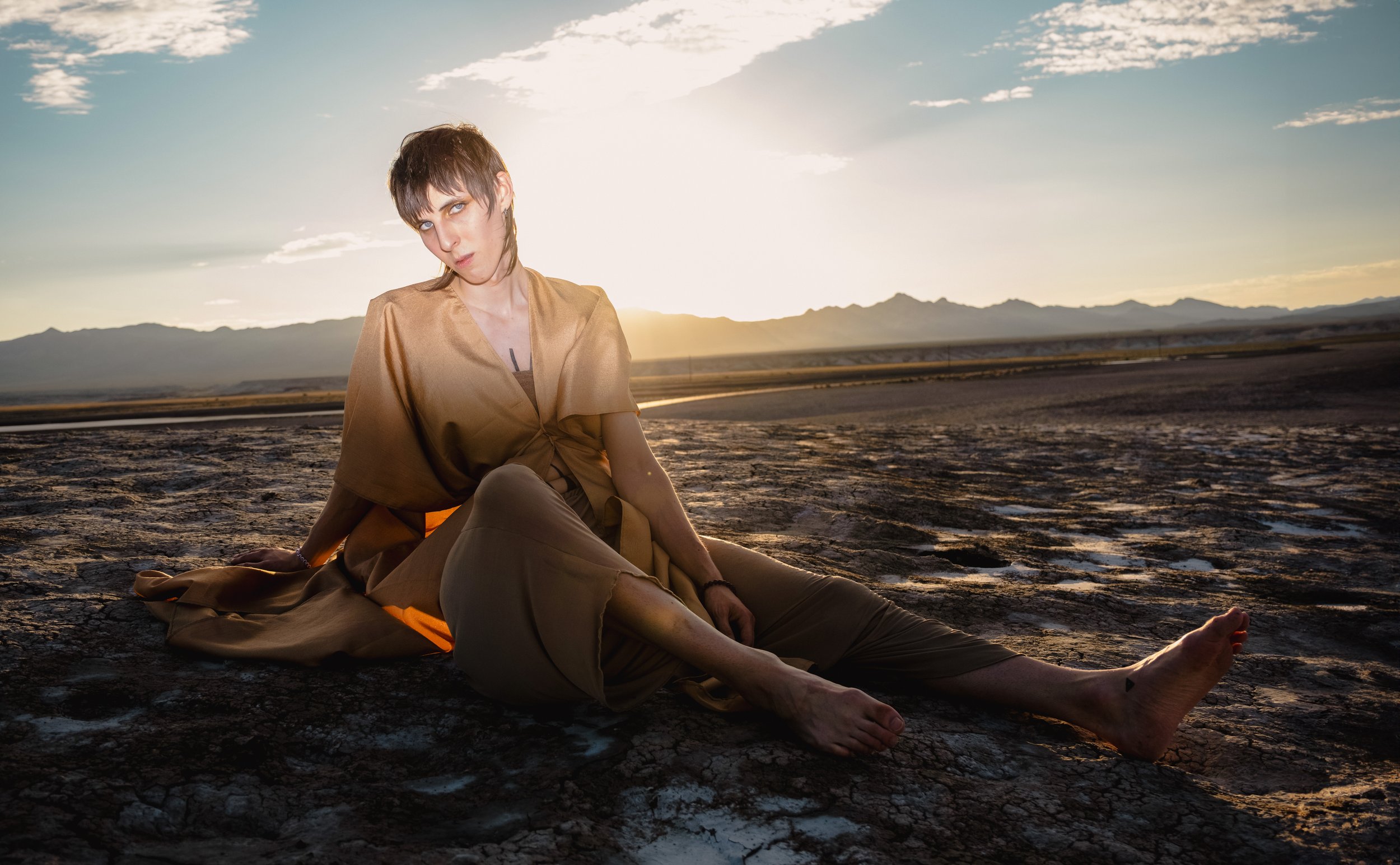Zine Queen, Void Walker, and Poet Extraordinaire
An Interview with Elizabeth Allen Berry
By Jade Darr | Photos by David Garzón
Elizabeth Allen Berry lives in a sacred art haven. The walls are covered in art, painted with vibrant violet murals and modge-podged with poetry. The corner bookcase is stuffed with works spanning dozens of genres and cultures. Step into the backyard, and you’ll find yourself walking toward Elizabeth’s office, a sort of standalone tiny-home studio with a chic recording setup and a table covered with recently-printed Zines. It’s an artist’s paradise: a DIY creative workshop that, with so much love and work put into it, now looks like the sort of space you’d stumble across in a fashionable furniture magazine. This combination of polish and personality is at the heart of what Elizabeth does. They’re not the kind of artist who is content to speak about big ideas and future plans that may never happen. They dream, then they accomplish, and then they dream again.
You can put together Elizabeth’s resume just by looking at the artifacts around their home. The zines are from Elizabeth’s independent publishing house, Cosmic Q Publishing; it’s dedicated to publishing work by and for queer, neurodivergent, and transgender artists. Cosmic Q has published dozens of zines, and inside Elizabeth’s studio, they sit on a display like a miniature museum of the publishing house’s history so far.
Less tangible, but still present, is the poetry community that artists like Elizabeth have nurtured in Las Vegas over the years. They’re perhaps best embodied in the Cosmic Q Compendium that Elizabeth recently published, a volume that brings many of Las Vegas’s star poets into one glittering constellation. I sat down with Elizabeth to talk about their own poetry, the experiences that brought Cosmic Q into existence, and their journey into a local poetry scene that now thrives in part due to Elizabeth’s own contributions.
It's been quite a road to get here, though. Both artistic and queer identities take a long time to develop, and like myself, Elizabeth was born into an environment — and life path — which ran tangentially to what they truly wanted to be. They started writing poetry when they realized that they could carve their own life path and identity for themselves.
“I was living in Wyoming and I had just gotten my degree, which was in a technical science background — biology with entomology. So I was writing a lot of really technical papers,” says Elizabeth. “I graduated, and it was in that moment that I was like, I need to change my name, I need to own my femininity.
“Through that experience, that's when I wrote the first two poems that are in my upcoming book. It was that little girl that was screaming into the void. It was just this voice that I found, and they resulted in those first two poems, which are called 'Broken Spoke' and 'One Word Homicide.' They're both about me grappling with the idea that I'm both feminine and masculine and not being able to really communicate that.
“Since then, any time I feel stressed or upset or have any big emotions, I find myself being like, where's my pen? You know what I mean? I need to write this down! I need to understand where I'm at. I have a lot of people in my life who say, ‘Poetry saved my life,’ and that continuously resonates with me, as much as I sometimes don't want to own it. Poetry did save my life. It allowed that little girl, that very effeminate voice, to express themselves.”
Like so many other queer people, I discovered my gender and sexuality during the pandemic, and I did the only thing I knew how to do: I wrote everything I could possibly write to figure out what exactly I was feeling. I could nail down a handful of scattershot feelings, but I couldn't understand how they all came together. I was trying to find a framework in which I could understand myself, especially because queerness is defined so differently in each queer space. As a queer publication company, Cosmiq Q is very aware of this phenomenon and has even built their identity around it.
“That's also why Cosmic Q Publishing is for those as queer as the cosmos — each individual has their own voice and their own queerness,” Elizabeth tells me. “Your non-binaryness is going to be a totally different cosmic entity than my non-binaryness and how we relate to our bodies and the people around us.”
Poetic journeys often start with the individual, but if you’re sharing your work to any serious extent, it’s almost guaranteed that strong voices will find a larger audience. Soon after Elizabeth started performing at open mics, their perspective on their own work changed.
“As I got on stage and shared it [my work], people were just reflecting — well, this is profound,” says Elizabeth. “That's the biggest part of poetry, always, for me — we're always going to say something that relates to someone else. They might say, ‘Thank you, I needed to hear that.’ And the throughline — the first two poems I wrote five years ago are going to be part of my upcoming book. They're part out chapter two, Out of the Plains, about my experience coming out as a trans woman in Wyoming. They're always really directly related.
“Since then, I've found more of a voice. I've found more of who I am as a poet on stage, who that character is — the Void Walker, forever in between. These poems will always resonate for me. And they blow my mind! Obviously, I've edited them. It blows my mind how looking at the original notebook with my handwriting — like yo, dude! At this point I meet a lot of people who want to get into poetry or have this novel idea. That's cool — we have all these future ideas. But your first writing, your initial foray into any art, is going to be the most profound, prophetic — like yes, dream big, do all these things in the future — but those first things you wrote, go back to them! I have this friend who started writing poetry as a teenager. Twenty years later, she's like — oh my God, this is so me! This is exactly who I am. I love those
little points.”
As a teacher, I see that all the time. A student will write something, and it might be raw, not too technically refined, they haven't quite figured out exactly how to say what they want to say. But there are flashes, and sometimes those flashes are entire poems and entire stories. Anyone, at any point in their life as an artist, can create something of true beauty and value. At first, artists might not recognize the value in their own work due to their confidence or due to their current closeness to the work, but through the eyes of others — or even through their own eyes in the future — that value can come to life. As someone who teaches poetry to kids through a nonprofit, Elizabeth often sees the same phenomenon.
“The stuff that comes out of kids' mouths. You're just like, oh my God, my heart, Jesus Christ!” says Elizabeth. “Part of me wishes I had poetry as a kid, but I had other mediums. I was a performing violinist, I had music, I was in show choir. I was in these very physical things. But I always want to give tools to people that I wish I had as a kid.”
Despite Elizabeth’s movement away from science in the academic space, their training in biology still has a dramatic impact on their work and thinking. When I ask them about their literary influences, that’s the first area they dive into.
“There are a couple, and honestly, there are technical entomological writers,” says Elizabeth. “There's E. O. Wilson, who's The Ant Guy. I've read his autobiography, and the way he wrote about his life and the way he interacts with animals just gets me, I don't know. And then there's Speak, Memory by Vladimir Nabakov - he wrote Lolita - but he was also a profound entomologist who worked at Harvard and has almost a thousand insects (don't quote me on that) that he collected and named. So those two are very in the poetic space of like, oh, yo, the way that I interact with science is actually much deeper than this linear space.”
Then there are graphic novels, which demonstrated to Elizabeth the extent that written and visual art can complement each other on the page.
“I have a lot of graphic novelists. That's kind of why I got into the zine world,” says Elizabeth. “I just love that autobiographical - like Maus - Art Speligman - I just, ah! I can never say enough about that. It was telling this raw, intense story about his father's experience of the Holocaust and how he relates to his father. All the metaphors around how he drew each person, and the framing - it brought to life this medium that I didn't understand. My poetry can be more than the words on the page. I need to add my illustrations.
Then there's Maia Kobabe - e, eir, es are e's pronouns - e created Gender Queer, which is the most banned book in the world, and it's also a graphic novel about e's gender and how eir interacts with the world. It's very visceral and painful and beautiful. E signed my book this summer, so that was very wholesome. Then there's Persepolis. So those are my three big graphic novels.”
Like most artists, Elizabeth can go on and on about their artistic influences and loves. What makes their outlook special is their intense focus on community and their thankfulness for those who helped them move forward. Everything from their poetry to their publishing company is connected to those around them, and when I ask them about the local scene, names spill from their mouth. Ash DelGrego, founder of Campfire LV Open Mic. Monarch the Poet, a local slam legend. Ms. AyeVee, titan of the Vegas literary community with more features and publications to her name than we can count. And that’s just the tip of the iceberg.
Their biggest project right now is Cosmic Q Publishing, a press they set up for publishing their own work that has now expanded to publish all sorts of queer, neurodivergent and trans artists across Vegas. In a lot of ways, Cosmic Q has come full circle; Elizabeth’s had the opportunity to publish several artists who initially welcomed them into the community. For something that sounds so niche, Cosmic Q has seen a ton of success without having to cut corners or sacrifice values.
“A, not only have I sold a lot of the copies, but B, we had this release party at Avant Pop, and it got all eleven poets up on stage,” Elizabeth tells me. “It's this safe space for people who might be quiet or timid, to just own the room. We packed the bookstore. It was so full that I had people show up that had to leave because it was too full. That's the kind of space that I want to keep garnering because that is what I needed when I was younger. Now it allows me to share that space and share that privilege to be unapologetically ourselves.”
Of course, this is exactly the sort of experience that resonates with me. When I was first starting out as a poet, I was confused and conflicted. I didn’t know what I was supposed to write about, or how I was supposed to write it. Eventually, I ran into poets like Gertrude Stein whose aim was to destroy the boundaries of language itself, to write through the impositions of patriarchy that were ingrained in English as a language. After reading her sentences, anything seemed possible. When I read the sonic bombardment that was my poetry thesis before an audience, I felt a rush like I’d never felt before. Something very new, and something very me, was finally able to find a world that appreciated it. That feeling is a large part of what drives Elizabeth to this day.
“My continual reminder to everyone that I ever meet is: I love being on the mic, I love performing, but something I love more than performing is seeing someone get on stage and say, ‘This is my first time on the mic,’ says Elizabeth. “Like, shivers! I get that privilege to hear you? To truly witness you for the first time ever? I'm in love! I love every part of you right now. That's all I ever want - to see people continuously reinvent themselves and allow that space to be anew because of what it felt like for me to choose my name and be a new person and stand on stage and own that. Looking back in my film roll, I found a picture of the first flyer from my first poetry reading, and it had my new name on it. That was five years ago. Wow. The chance to just be anew. That's so special.”
It’s no surprise that Elizabeth’s view of Las Vegas is complicated, but ultimately circles back around to the community love and support that courses through the poetry scene. Everyone knows Vegas is a strange place, but Elizabeth’s view on it is mostly focused towards a literary art boom and a bright future. They list off event after event, venue after venue that is supporting artists. I can’t imagine hearing them talk and not feeling full of hope for the future of Vegas art. In the end, Elizabeth’s outlook on Vegas is also personal. It’s provided a radical shift from that of their hometown, allowing them to evolve into their true self while also opening their mind to the new perspective that fuels their work.
“To go into how place affects my poetry, it is very much a reflection of where I'm at,” says Elizabeth. “There's a piece in my upcoming book called ‘God's Country,’ and it's about the experience of going back to visit my brother in Omaha, Nebraska. I grew up in the midwest, so it starts out as a love poem - how gorgeous the valleys, the rolling hills, you know, you know, who knew God loved all these drive-thrus? You know what I mean? And then just remembering what it feels like to be in this Christian, God-loving, God-fearing space, and it breaks down.
“But visiting places like San Francisco - visiting each place is a reflection of who I am and where I'm at in that moment. It allows that space to reinvent my poetry and learn new words. I think that's particularly why I have some poems in German and why I'm motivated to leave the country because not only will I have access to language that will allow me to express novel thoughts, but will also allow me to see totally new things that then allow me to reinvent myself. As queer, non-binary, transgender, neurodivergent...all those things come together to make me be like, "I need new experiences! I want to feel the world! I want to know everything!" Spaces allow new space for me to create novel thoughts.”
You can support Elizabeth’s work through their publishing company, Cosmic Q Publishing, and by attending their slew of events in the city, which you can keep track of by following their social media @elizabethallenberry.




